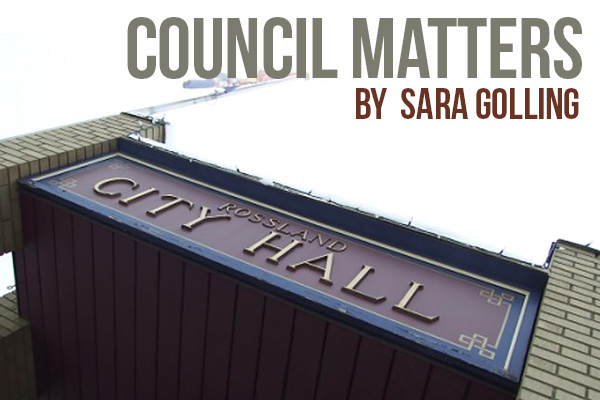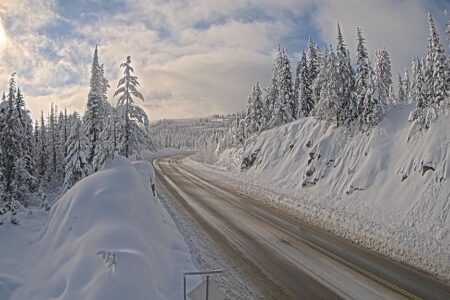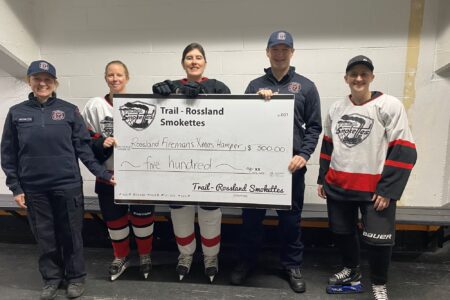Council is in favour of more beer; a food charter in the works; paving may be delayed by cold
Present: Councillors Andy Morel (acting Mayor in Kathy Moore’s absence), Lloyd McLellan, Aaron Cosbey, Marten Kruysse, John Greene, and Andrew Zwicker.
Public Input Period: Petri Raito of the Rossland Beer company said he supports the proposed bylaw to allow for a larger micro-brewery in Rossland’s downtown core. Cosbey moved that Council advance that agenda item to immediately follow the delegations, and the motion CARRIED unanimously.
Delegations:
1. Deanne Steven presented an update on Tourism Rossland, and expressed hope that the City would enter into a 3-year agreement with Tourism Rossland’s annual grant from the City tied to business licence revenues, so that she would not have to go through the grant application process every year. Cosbey asked if she would be satisfied with a 3-year agreement for an adequate set annual amount instead of tying it to business licenses and Steven agreed that she would.
One of the proposals from Tourism Rossland was the establishment of a “downtown business committee to look at different strategies for collaboration and development.” Greene asked whether this would be intended to replace the Chamber of Commerce, and Steven said no, that was not the intention.
Steven announced that Tourism Rossland is now housed on the third floor of the old Bank of Montreal building.
2. Caley Mairin of the Rossland Food Group reported on progress toward a food charter for Rossland, and on its uses. She noted that many other communities have already adopted food charters, and that having one in place makes it easier to apply for some granting streams. It can also provide guidance for some land-use decisions. The group is hoping to gather public input on the draft charter in November, and asked that Council also provide input. The “big ask” is that Council adopt the final version, as part of the OCP, or perhaps incorporated into an updated Strategic Sustainability Plan.
Cosbey commented that he would like to know about the process used in other communities with food charters, and how they have adopted the charters into their official policies.
Kruysse said he thought Rossland isn’t much good for producing crops, and that we should focus on tourism instead, and then buy food from other surrounding communities that are better at producing it. Mairin responded that while focusing on tourism is good, Rossland can produce quite a lot of food; and she pointed out that sometimes a food-production area can have unexpected crop failures or shortages, with spikes in food prices, and that bringing food in from other places can become difficult.
Cosbey stated that during the Communities Adapting to Climate Change process, they learned that California — which produces a significant percentage of the food we buy — is expected to continue suffering from worsening drought, and that cheap and plentiful food from elsewhere is not something we can expect in future. McLellan noted that he has known people to grow watermelons and cantaloupe in Rossland; Morel reported that he harvested 50 pounds of tomatoes from his garden just before the frost hit.
Zoning Amendment Bylaw:
Council moved to give third reading to Bylaw #2619, for a zoning amendment to the Commercial Downtown Core (C-1) to allow for a larger micro-brewery. The motion CARRIED unanimously, with Cosbey commenting, “Council is in favour of more beer!”
Recommendations from Staff for decision:
Council unanimously passed motions to:
1. approve the Emergency Operations Centre Wage Activation Policy;
2. direct staff to participate in the West Kootenay Inter-Community Business License program; this program would enable a business that operates in several communities to purchase an Inter-Community Business License for $85, once it has purchased a regular business licence from the community where it is based, instead of purchasing separate licenses from all the communities in which it operates;
3. issue a Development Permit and approve signage to be erected on the west side of Black Bear Drive, for the Lions Campground;
4. to approve a Development Variance Permit application for 2384 Fourth Avenue, reducing the exterior side setback to zero, for new construction. The current carport/deck encroaches on the City boulevard. The variance will permit a replacement carport which does not encroach.
5. to direct staff to renew the Regional District of Kootenay Boundary Planning Agreement for cost sharing of Part 14 services, based on the revised 2016 annual requisition.
Council then discussed the issue of plowing (or not plowing) City roadways which serve only one household. For a detailed account of that discussion, please see the separate article on the topic. Ultimately, Council passed a resolution to make no changes to the City’s plowing policy for this winter.
More Bylaws:
Having already given third reading to the “bigger brewery” bylaw, Council then passed the following motions:
1. to adopt the 2017 Revitalization Tax Exemption Bylaw #2620;
2. to adopt the 2017-2018 Permissive Tax Exemption Bylaw #2621 — McLellan opposed the motion “on principle” as he thinks some on the list should not be exempt;
3. to give first and second readings to the Water Rate Bylaw #2622;
4. to give first and second readings to the Sewer Rate Bylaw #2623.
Staff Updates and Reports:
Albo reported that a number of businesses are making in-kind donations to the skatepark: Corix Water Products is donating all the pipe, Kon Kast of Kelowna is donating all the concrete barrels, and CopCan is going to removed all the asphalt, dig in the perimeter drains, and more. Council passed a motion for the City’s Public Works department to contribute a few hours of labour to haul away the old asphalt.
Albo explained that the final paving on the Washington Street Project, scheduled for this week (Thursday, Friday and Saturday) will probably be delayed, because the air temperature must be “5 degrees and climbing” or there is no warranty on the work.
Miners Union Hall: The City is awaiting word on two grants which will determine how much additional work can be done, before putting anything further out to tender.
Albo reported that the bin wall replacement on Columbia Avenue, being built by the Ministry of Transportation and Infrastructure, still has about three weeks of work to go. He confirmed that the roadway above the wall will be wider than it was before, but that the highway — Columbia Avenue — will be narrower next to the new retaining wall, with less space for snow storage.
Council discussed the sustainability committee minutes; the Resort Municipality Initiative report; a letter from the Green Communities Committee awarding Rossland “Level II recognition” for measuring its greenhouse gas emissions; an invitation from the Village of Warfield to meet and discuss “areas of mutual interest and overlapping concern” as Warfield develops it Official Community Plan; and a reapportionment payment of $18,003.00 from Warfield to Rossland for liquid waste management.
Council members reported briefly on their recent meetings and other activities.
Council then recessed to an in camera session, and your reporter donned puffy jacket, toque and gloves to walk home in the crisp clear evening, pondering California’s drought and other recent weather and climate manifestations, and the potential productivity of vegetable gardens in Rossland.
Garlic grows very well here. Potatoes, carrots, onions, lettuces, peas, beets, Swiss chard, bush beans, kale, broccoli, cauliflowers, cabbages, turnips and rutabagas, quinoa, various members of the mustard family, various herbs, and summer squash can all thrive in Rossland on lots with good sun exposure, and a reasonable degree of care and attention — even in cool moist summers.
In warmer, dryer summers, or in a greenhouse or poly-tunnel, corn, pole beans, tomatoes and some winter squash can produce very well too. A neighbour has grown wheat. Other gardeners can probably add to these lists.
























